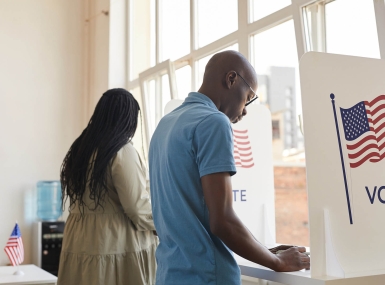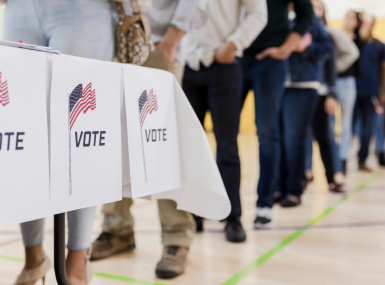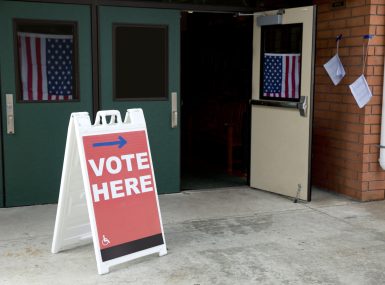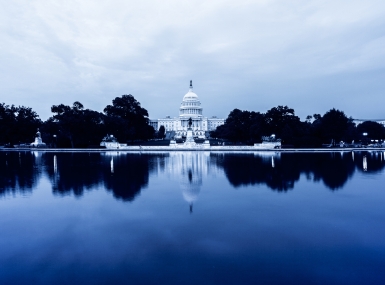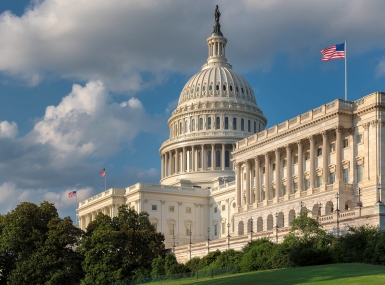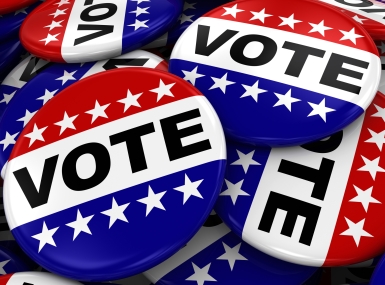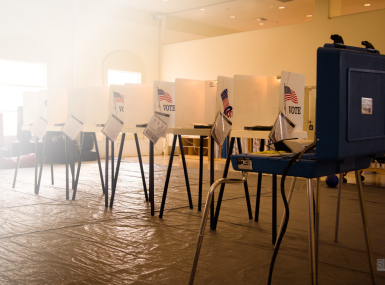Legislative Analysis for Counties: American Confidence in Elections Act

Author

Paige Mellerio
Upcoming Events
Related News
On July 27, the U.S. Committee on House Administration Ranking Member Rodney Davis (R-Ill.) and Subcommittee on Elections Ranking Member Bryan Steil (R-Wis.) introduced the American Confidence in Elections Act (ACE Act; H.R. 8528) that, if enacted, would make campaign finance reforms, place limits on federal election requirements and emphasize the state role in the administration of federal elections.
While the bill would allow states to adopt any resulting recommendations or best practices on a voluntary basis, it would mandate several reforms to the administration of elections in Washington, D.C. (D.C.). The provisions placing election-related requirements on D.C. are intended to serve as model legislation for states to adopt in the future. As currently written, counties are concerned that these requirements would impose costly unfunded mandates on counties if a state chooses to enact this model legislation. Additionally, the bill would monetarily incentivize the adoption of certain policies related to voter eligibility in state and local elections by reducing federal funding available for states that do not choose to adopt these policies. Since counties rely on states to sub-allocate federal funding to support election administration and upgrade election infrastructure, this would limit the funding available to counties in states that do not adopt certain policies in H.R. 8528.
In sum, counties are concerned with the limits that would be imposed on the federal supports we rely on to maintain election integrity and security as well as the findings in the bill that presume states hold the primary role in election administration.
This analysis provides an overview of key provisions included in H.R. 8528 and how they may impact county governments.
Key Highlights
- Requires the U.S. Election Assistance Commission (EAC) to implement a state forum to share voluntary best practices and guidelines
- Incentivizes the adoption of state policies related to voter registration and eligibility
- Includes model legislation for states to implement certain requirements related to election administration using the District of Columbia as an example
- Simplifies U.S. Internal Revenue Service (IRS) reporting requirements for election workers
- Requires the U.S. Cybersecurity and Infrastructure Security Agency (CISA) to issue guidance related to election infrastructure cybersecurity
Overview of Provisions
If enacted, H.R. 4563 would reform federal elections in the following ways that would impact how elections are administered at the local level.
1. Election Administration
H.R. 4563 would make several reforms to the administration of elections at the state level that would have both direct and indirect impacts on the county role in elections. The bill begins with several findings related to the balance of federalism and administration of federal elections, including that the U.S. Congress holds a secondary role in elections and that federal election legislation should not impose unfunded mandates on state and local elections. The bill specifically asserts that states have the primary role in administering elections and enacting legislation to set the time, place and manner of elections.
Given these findings, the bill would make several reforms to election administration at the state level. While some of the reforms would be adopted by the state on a voluntary basis, the adoption of others would be incentivized through the availability of full federal funding. Specifically, the bill would:
Establish voluntary guidance for states: If enacted, H.R. 4563 would require the U.S. Election Assistance Commission (EAC) to establish a federal forum for state and local election officials to share information and best practices and develop voluntary federal guidelines related to several emerging issues in election administration. State and local election officials would participate through the existing Standards Board and Local Leadership Council advisory bodies at the EAC, respectively. The Standards Board and Local Leadership Council would have one year from the bill’s date of enactment to publish recommendations specifically related to:
- Mail-in ballots, specifically including deadlines for the return and receipt of ballots, ballot and ballot envelope design, ballot tracking and the processes and schedules for counting ballots
- Signature verification methods and training, as well as other methods of confirming voter identity
- Voter list maintenance
- Access for election observers
- Accurate and timely election result reporting
- Poll worker recruitment and training
- Community outreach efforts related to the certification and testing of voting machines
- Post-election audit processes
- Procedures related to the chain of custody of ballots
H.R. 4563 would also require the EAC as well as the Standards Board and Local Leadership Council to develop recommendations and guidance related to the use of nonvoting election technology. This includes electronic pollbooks, results reporting systems, electronic mail delivery, online voting registration, polling place location search systems, sample ballot portals, signature systems and other technologies not used for casting, counting or collecting ballots. These recommendations would not be mandated to states and the availability of federal funding would not be conditional on whether a state adopts these recommendations. The bill would allow states to use HAVA grant funding to implement these voluntary considerations.
COUNTY IMPACT
Counties applaud the inclusion of the recently established Local Leadership Council in consultations regarding the federal voluntary guidelines prescribed in this bill. A previously introduced version of the bill did not explicitly include local governments in the drafting of these guidelines.
Local governments are responsible for the day-to-day operations of running safe and secure elections. This includes: the determination and oversight of polling locations; allocation of voting machines; recruitment, training and retention of poll workers and election judges; accessibility of voting; and mitigation of “hard security” and cybersecurity risks. The county role in election administration is vital to the democratic process and should be recognized as such.
- Implement voter registration requirements: The ACE Act would either require or incentivize states to adopt certain practices related to voter registration and list maintenance. This includes prohibiting states that allow non-citizen voting in state and local elections from maintaining a single voter registration roll and from putting federal, state and local offices on the same ballots. States that allow or do not explicitly prohibit non-citizen voting would be prohibited from using federal funding to develop a single voter roll or non-citizen ballots, and any future HAVA awards allocated to the state would be reduced by 30 percent.
These provisions are intended to incentivize states that do not have specific prohibitions on non-citizen voting and therefore have the legal authority to permit non-citizen voting to adopt such prohibitions.
Other voter registration requirements and reforms in H.R. 4563 include:- Requiring states to report the number of inactive registered voters and number of registrants removed from the voter roll in their biannual reports to the EAC
- Allowing a state’s specific proof of citizenship requirements to be included in state instructions on the EAC’s national mail voter registration form
- Requiring first-time mail voters to present a current and valid ID or government-issued document that shows the name and address of the voter if registering to vote anywhere outside of an election’s office or state registration agency
- Recognizing REAL ID identification documents as valid voter ID and reforms the REAL ID Act to require “CITIZEN” to be printed on all qualifying individuals’ ID documents issued after January 1, 2026
COUNTY IMPACT
NACo is concerned that the provisions of H.R. 4563 that would make the availability of full HAVA fund allocation conditional on specific state laws. Federal assistance for elections is already limited and counties typically rely on states to sub-allocate federal funds. Reducing the federal HAVA grant to states by 30 percent would also reduce the amount of funding available to counties for election administration. These provisions have the potential to punish counties based on whether a state adopts an explicit prohibition on noncitizen voting.
Further, NACo urges the repeal of the REAL ID Act of 2005 as it places an unfair burden on the motoring public, threatens privacy and leaves citizens vulnerable to identity theft.
- Reform election mail handling: If enacted, H.R. 4563 would require the U.S. Postal Service (USPS) to prioritize election mail and mark all election mail with the date of receipt and processing as well as an indicator that the mail piece is election mail. The bill would also require USPS to deliver all election mail even if the jurisdiction’s account lacks funds or the piece of election mail lacks sufficient postage, and USPS would have the authority to collect postage payments after delivery. Under this provision, election mail is defined as any piece of mail sent to an individual for the purposes of participation in an election for public office including ballots, voter registration materials, polling place locations and voter photo ID materials. The bill would also require the USPS to coordinate with states to identify and assign a mailing address to each home in the state that does not currently have one assigned to it, prioritizing homes located on Indian land.
COUNTY IMPACT
The USPS is a critical partner to counties in maintaining election integrity. Counties support a domestic and international mail system that supports our election system and ensures that all voters, including those in the military and overseas, can fairly and freely participate in our elections. Such a system would include high quality delivery methods, tracking and notice of changes to impacted local governments.
- Support the hiring and retention of election workers: H.R. 4563 would allow states to show preference to veterans and disabled individuals when hiring election workers. The bill would also raise the minimum threshold for how much an election worker can make in un-taxable income before being issued an Internal Revenue Service (IRS) 1099 form from $600 annually to $5,000 annually.
COUNTY IMPACT
H.R. 4563 would not provide federal funding for election worker recruitment and retention but would simplify federal employment reporting and withholding requirements for counties’ hiring of election workers, which can be an administrative burden for county governments. Counties support a consistent federal funding stream that would allow us to recruit, train and retain high-quality individuals that administer elections.
Clarify HAVA-grant eligible activities: The ACE Act would allow HAVA grant funds to be used to conduct post-election audits and would prohibit states from accessing federal funds to administer elections if the state does not implement certain restrictions on ballot harvesting and the transmission of mail-in ballots. If enacted, the bill would specifically require states to have or enact a law to prohibit the transmission of ballots in a federal election by anyone other than the individual the ballot was mailed to, a family/household member or caregiver, election official, USPS employee or any other individual legally authorized to collect and deliver U.S. mail in order to access HAVA grant funds.
H.R. 4563 would also prohibit any EAC or other federal funds from being used for “get-out-the-vote” (GOTV) activities. The bill defines GOTV as all means of assisting, encouraging or urging potential voters to vote[1], including but not limited to encouraging potential voters to vote, informing voters about polling times and locations, and offering to arrange or arranging transportation to the polls. This includes any activity that is targeted or thought to be targeted to a particular voter or group of voters on the basis of political affiliation, their expected votes, their place of residence or some other demographic feature.
If enacted, the bill would also require HAVA fund recipients to include a clear disclosure in all public written, video or oral communications that have been fully or partially funded by federal election funds. Lastly, the bill would require the EAC to publish guidance on permissible uses of HAVA funds.
COUNTY IMPACT
Counties applaud that the bill would expand eligible uses of HAVA funds to include post-election audits as they can require significant time and resources. However, NACo is concerned that the provisions of H.R. 4563 that would make the availability of federal funds to assist with election administration conditional on specific state laws. Federal assistance for elections is already limited and counties typically rely on states to sub-allocate federal funds. By prohibiting the use of federal HAVA grant funds in states that do not have explicit restrictions on who may transport mail-in or absentee ballots, the bill would thereby restrict the availability of federal funds for elections to counties in that state. Counties are concerned these provisions could unfairly impact the funding necessary to administer elections based on whether a state adheres to specific requirements of the bill.
- Prohibit private funding in election administration: The ACE Act would establish a federal prohibition on non-profits from providing direct funding for election administration or in a case in which it is reasonable to expect such funding will be used for election administration. The bill does, however, include a specific exception with respect to the donation of space to a county or local government to be used as a polling place.
COUNTY IMPACT
As of July 2023, 24 states prohibit, limit, or regulate the use of private 501(c)(3) funding to be used for election administration. Counties support a consistent federal funding stream that would allow us to recruit, train and retain high-quality individuals that administer elections.
2. U.S. Election Assistance Commission
If enacted, H.R. 4563 would clarify key authorities of the EAC and its role in federal elections. The bill recognizes the EAC’s role as the primary federal agency with authority to provide election assistance to state and local governments through information, grants and testing and certifying election equipment. The bill would also grant exclusive authority to the EAC to make election administration grants to states for the procurement of election and voting infrastructure, enhancement of election and voting technology and improvement of election security. The bill would also:
- Cap EAC staffing and funding: The ACE Act would implement a requirement that the EAC maintain no more than 55 full-time employees with a budget of no more than $25 million in Fiscal Years (FYs) 2024-2026. HAVA currently caps the authorized EAC administrative funding level at $10 million, and H.R. 4563 would more than double the authorized amount. These additional funds could not be used for the operations of any EAC-established advisory committees although the bill specifies exceptions for the new Local Leadership Council, the Standards Board, Board of Advisors and Technical Guidelines Development Committee. Additionally, the EAC would be required to submit its annual budget request to the U.S. House Committee on Administration and the U.S. Senate Rules Committee.
- Authorize the Standards Board to enter into contracts: H.R. 4563 would authorize the EAC Standards Board to enter into contracts with no more than two individuals (one from each political party) to review and publish the voluntary recommendations that result from the state forum prescribed in this bill. The authority to enter into these contracts would be terminated on the earlier of the completion of the recommendations or December 31, 2023, and the bill would not authorize funds for the EAC to enter into said contracts.
- Establish qualifications for the Local Leadership Council: If enacted, the ACE Act would require the EAC to ensure, to the greatest extent possible, that no two Local Leadership Council appointees from each state are of the same political affiliation in their professional capacities.
COUNTY IMPACT
NACo strongly supports the role and functions of the EAC and appreciates the important role the EAC plays in coordinating collaborative efforts among local, state and federal government officials in addressing issues associated with the field of election administration.
3. Election Security
If enacted, the bill would require the federal government to undertake the following actions related to election security and cybersecurity:
- Report on foreign influence: H.R. 4563 would require the U.S. Department of Homeland Security (DHS), Director of National Intelligence (DNI) and other relevant federal entities to submit a joint report to Congress and the chief election official in each state on foreign threats to U.S. elections. In building this report, federal officials must solicit and consider voluntary feedback from all election agencies in a state, including county election offices.
- Election equipment testing: The bill would require the EAC and the Cybersecurity and Infrastructure Security Agency (CISA) to jointly establish a voluntary process to test and monitor voting systems and equipment for cybersecurity vulnerabilities certified in accordance with the EAC’s Voluntary Voting System Guidelines (VVSG). This process must include mitigation strategies and other remedies for cybersecurity vulnerabilities, and testing labs would be required to provide notice to the EAC of the results of testing conducted under the prescribed process. The EAC would also be required to establish a process to provide for the appropriate labeling for voting systems, to be made available through its website, to indicate that such equipment passed its most recent testing process.
Cybersecurity testing is not explicitly required by HAVA, however, the EAC’s VVSG 2.0 guidelines issued in February 2021 as the first major update to the guidelines since 2005, included cybersecurity requirements. The VVSG is completely voluntary for states and is limited to EAC-certified voting equipment. Only 11 states and the District of Columbia (D.C.) statutorily or regulatorily require full EAC-certification for voting equipment, although 38 states and D.C. use at least some aspect of these federal certification requirements in addition to state-specific requirements[1]. - Cybersecurity incident reporting: H.R. 4563 would require the federal entities to report any information it receives about an election cybersecurity incident to DHS. DHS would then be required to consult with the U.S. Attorney General, Federal Bureau of Investigation (FBI) and DNI to determine whether the event credibly occurred and resulted or could have resulted in election systems being affected and notify the chief executive, state election official and local election official of the state and election agency involved. If it is determined that such a notification would compromise intelligence methods or sources or interfere with an ongoing investigation, the incident would not be shared with state and local officials.
The bill would also require CISA to collaborate with the EAC to determine whether it is necessary to publish advisories relating to the cybersecurity of election systems used in administering federal elections or the general cybersecurity of federal elections. If such a determination is made, CISA and EAC must work together to prepare such an advisory and shall provide the advisory to the appropriate state election officials and vendors of voting systems covered by the notification. - Disinformation Governance Board: If enacted, the bill would terminate the DHS’s Disinformation Governance Board. This internal advisory board was created in 2021 to disseminate guidance on mis- and disinformation but was dissolved in August 2022 following the recommendations from the Homeland Security Advisory Council (HSAC). This bill also prohibits funds from being appropriated to establish or carry out activities that are substantially similar to those of the Disinformation Governance Board.
COUNTY IMPACT
Counties believe secure elections are a central component of our nation. NACo supports efforts by Congress to combat the cybersecurity threats that negatively impact public perception of the integrity of elections. As such, legislation should involve county election authorities in addressing these threats, and counties appreciate the inclusion of provisions that require information sharing between federal, state and local authorities in H.R. 4563.
NACo believes it is essential that election cybersecurity guidelines and grant administration remain coordinated within the existing structure of the Election Assistance Commission (EAC) rather than having a new federal entity develop potentially conflicting guidelines.
4. Model State Legislation
H.R. 4563 would mandate several reforms to the administration of elections for public office in the District of Columbia (D.C.). The requirements are similar to the federal election recommendations within the bill for state legislatures to adopt on a voluntary basis or on the condition of availability of HAVA funds but would apply to elections for public office occurring in D.C., including for Federal office and any ballot initiative or referendum. In the case of federal elections, H.R. 4563 would mandate D.C. to:
- Require voters to present photo ID to vote in person or request a mail-in ballot, and to maintain copies of photo IDs of individuals requesting to vote by mail in poll books
- Only issue mail ballots for a D.C. election if requested by an eligible D.C. voter and prohibit the issuance of unsolicited ballots
- Implement certain signature verification procedures for mail-in ballots, including a requirement that a signed and dated certification of ballot transmission is returned with the ballot; D.C. would still be required to notify voters of signature discrepancies and allow an opportunity to cure the defect
- Prohibit ballot harvesting or allowing anyone other than the individual a ballot was mailed to, a family/household member, caregiver, election official, USPS employee or anyone authorized to collect and deliver mail from transmitting ballots for a D.C. election
- Only accept mail-in ballots received by an election official at the closing of polls on election day, excluding absentee military and overseas ballots
- Prohibit same-day voter registration and require voter registration by 30 days prior to a D.C. election
- Conduct voter roll list maintenance annually and remove individuals that have not voted in D.C. elections during two consecutive years, have failed to respond to an issued notice and have not voted in the four years or two D.C. general elections since the notice was sent
- Report unofficial election results by 10 a.m. the day after a D.C. election, and prohibit ballots from being tabulated or reported prior to polls closing on election day
- Make the number of ballots received by D.C. publicly available after polls close on election day, including the number of mail-in ballots in possession of election officials
- Prohibit non-citizen voting in D.C. elections
- Only count provisional ballots if they were cast in the correct precinct unless the individual is further verified as a registered, eligible D.C. voter by an election official
- Conduct post-election audits and publish results before the period to contest an election expires, or no later than 30 days after an election and two days before the period for a candidate to contest an election ends
- Allow access of election observers to view the casting and tabulation, canvassing, processing and recount of ballots if the individuals are specifically designated by a candidate, political party or sponsor of a ballot initiative, and to allow the public to view the testing of election equipment
- Place restrictions on the use of ballot boxes by requiring them to be located within a D.C. government facility, monitored through 24-hour remote or electronic surveillance, and requiring ballots be collected each day after 5 p.m.
COUNTY IMPACT
While this section of the bill would not directly impact the county role in elections, these specific bill provisions are intended to serve as model legislation to be introduced in state legislatures related to federal legislation and could impact the county administration of elections if states enact these model bills.
[1] National Conference of State Legislatures. (2021, November 5). Voting System Standards, Testing and Certification. National Conference of State Legislatures. https://www.ncsl.org/research/elections-and-campaigns/voting-system-standards-testing-and-certification.aspx

